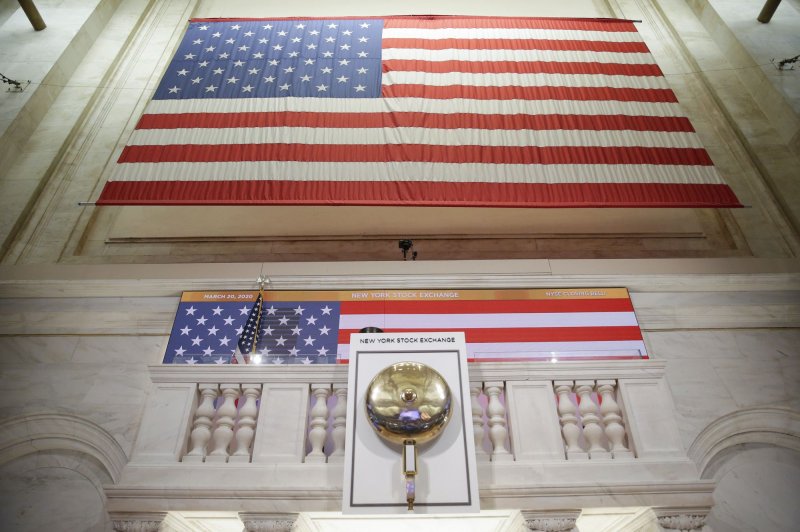
American Flags hang last Friday at the empty platform where closing bell ceremonies usually take place at the New York Stock Exchange, on Wall Street in New York City. Photo by John Angelillo/UPI | License Photo
March 26 (UPI) -- The number of Americans who believe an economic recession is likely to occur in the United States has increased by about 50 percent in one week, a Gallup poll shows.
The survey, released Wednesday, found that 61 percent of Americans polled last week think there's likely to be a recession, up from 38 percent the week before.
Gallup said 31 percent believe a recession is somewhat likely to occur, while 8 percent don't think there will be one.
In terms of political affiliation, Democrats (83 percent) are more likely than Republicans (35 percent) to believe a recession will happen, and 60 percent of independents believe there's likely to be one. The numbers have increased for all three since mid-March.
Those with the highest annual income -- $90,000 or more -- are most likely to believe a recession will happen, at 69 percent. Fifty-seven percent of people making $36,000 to $90,000 believe a recession will happen, while 60 percent of those making less believe so.
Meanwhile, 18 percent of Americans believe it's very likely their household will have "major financial struggles" because of the coronavirus pandemic. Thirty-four percent say struggles are somewhat likely to happen, 39 percent say it's not too likely and 9 percent say it's not likely at all.
The number who believe their financial situation is likely to suffer is up from 10 percent from March 13-16.
Those in lower-income households are more likely -- nearly three in 10 -- to believe they'll struggle financially than those in higher income brackets.
As the coronavirus spreads in the United States, more states and local jurisdictions have been implementing stay-at-home orders for non-essential workers and directing non-essential businesses to close.
The Labor Department said Thursday 3 million additional unemployment claims were filed last week, the largest weekly increase in U.S. history
No comments:
Post a Comment